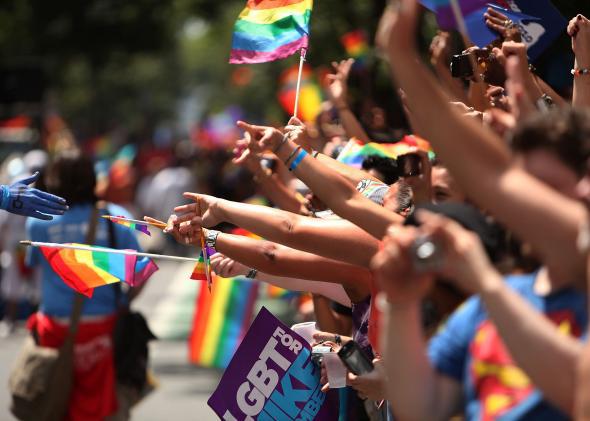On Saturday, I went to Pride for the first time in about 12 years. Some friends and I had decided to meet up for dinner and then head downtown for the parade, so at 4:30 I grabbed my keys, fed the cat, and headed over to meet them. Walking through the back gate, I found a group of teenagers painting themselves rainbow colors. We were all straight. Somehow, none of our LGBTQ friends had made it. It wasn’t that they weren’t invited; it was just that, for some reason, watching a bunch of their heterosexual friends get psyched up for Pride didn’t seem all that fun. Everyone in attendance was just a little too busy with the body paint to recognize this, to think that maybe a parade intended to celebrate the LGBTQ community and combat the shame and stigma so often attached to it, was not the best time for straight people to stand out.
I felt embarrassed walking down the street, because my straight friends were more flamboyantly “proud” than most of the actual LGBTQ people in attendance. I couldn’t understand why my normally incredibly socially conscious friends couldn’t see that what they were doing was a little bit iffy.
I realize I was being oversensitive and a bit sanctimonious. Allies are important. It is amazing that there are so many people so supportive of the community. And having watched homosexuality become more and more accepted over the course of my lifetime, the significance of teenagers, particularly boys, willing (and, honestly, a little bit eager) to be mistaken for gay wasn’t lost on me.
What I was having trouble with was reconciling where I fit into all this. I’m the daughter of two lesbians, and as I prepare to leave home for college, I find myself questioning my place in the LGBTQ community.
I guess I would identify as heterosexual, but saying I’m straight feels like erasing my gender-androgynous, heteronormative-nonconforming upbringing. As I get older and more independent from my parents, I feel a certain kind of loss. When I think back to the Pride parades of my early childhood, I remember loud noise and vibrant color as my mothers pushed me around in my bright blue stroller. I remember bangles and banners and the street vendors throwing small plastic toys to all the children. I especially remember the free toys.
And while the noise and color are without a doubt still staples of my Pride experience, on Saturday night I felt disconnected from it in a way that I never had before. Same-sex issues will always be a part of my life, because even if I am never in a same-sex relationship, I am a member of a same-sex family. Nevertheless, as I separate myself from my parents, I separate myself from the place in the LGBTQ community that I held as a small child. That’s what bothered me most about my friends: They were able to insert themselves into the role of allies without the sense of loss and complexity that role holds for me.
So as I begin to leave home, I’m not only trying to figure how to do my own laundry, but also what it means to be the adult child of same-sex parents. To many well-meaning people, it is practically heresy for me to say that I am different because of my parents, but for me to deny that difference would be, in my mind, a rejection of my family and their politics. I am now left with a question: Am I straight with a difference or simply trying to insert myself into the LGBTQ community the same way my colorful, well-intentioned, heterosexual friends did at Pride?
